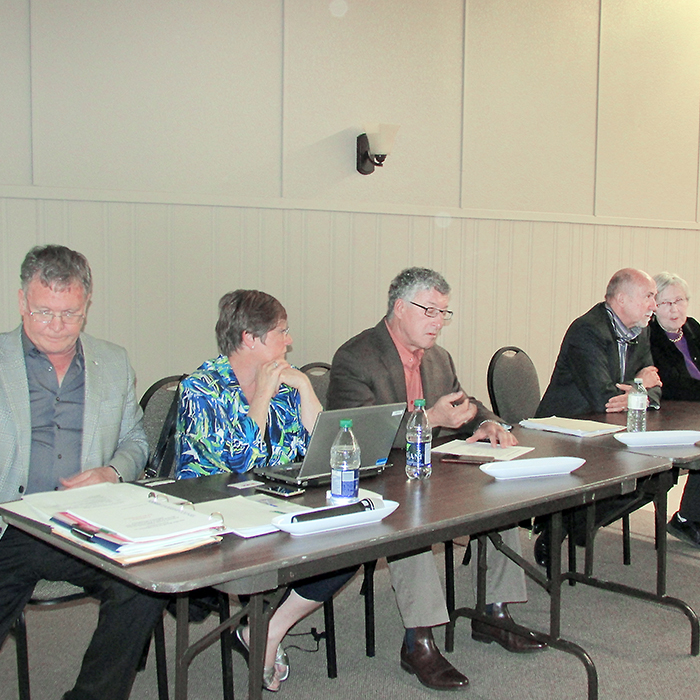
Members of the Sydenham District Hospital Board and the Chatham Kent Health Alliance met last Tuesday as the board considered its options regarding health care in Wallaceburg. Notables attending were SDH board chair Sheldon Parsons, left, and CKHA CEO Colin Patey, second from right.
The real and philosophical battle over health care for residents in the North Kent, south Lambton and Walpole Island First Nations shows no sign of abating.
The Chatham boards suspended governance earlier this month as the result of the SDH board refusing to support Chatham Kent Health Alliance CEO Colin Patey’s plan to close the Wallaceburg hospital’s emergency department and replace it with a 7 a.m. to 11 p.m. clinic with no doctor on site.
Jane Havens, acting chair of the Public General board and spokesman for both it and the St. Joseph’s Board, said those boards have no interest in returning to the current system since “there is no common vision” on health care.
She said it appears Sydenham District Hospital board members (who under the Alliance’s governance agreement have veto power) believe Wallaceburg residents “have more right to safe, quality services” than the rest of Chatham-Kent.
Havens said a major stumbling block is the fact that SDH board members are elected at open board meetings by the hospital’s membership.
“One of the issues of governance that we have struggled with is that they (SDH members) see themselves as being elected by that membership.
It’s like trying to serve two masters. “
“They aren’t interested in the rest of Chatham-Kent,” she said. “We come wearing a Chatham-Kent hat and they come wearing a Wallaceburg hat.”
Members of the Chatham boards operate in a closed system in which applicants for the board must apply and be vetted in a confidential process before being approved.
Chatham Mazda from Chatham Voice on Vimeo.
Havens said Wallaceburg accounts for five per cent of the services and program activity of the CKHA but one third of the board’s voting power.
She said the provincial funding model has changed over the years and the SDH board members are unwilling to accept that.
She said funding is being directed away from hospitals to community-based functions because hospital care is the most expensive option.
“We have been getting zero per cent or less some years while other sectors are getting four per cent. We’ve had to consolidate services but no one has been denied services. Consolidation seems like a loss to SDH.”
Havens said the Chatham boards want to move forward but not under the current model.
“We don’t believe you can negotiate the financial future of the Chatham-Kent (alliance), we don’t believe you can negotiate on issues of quality, safety and community access. We can’t continue in this vein anymore. We’re not going back to a governance model that doesn’t work.”
She said the boards have retained legal counsel and will consider their options but remain committed to “moving forward.”
In terms of the Erie St. Clair Local Health Integration Network that oversees the Alliance she said, “The LHIN has not been very helpful on the governance matter. They believe we should work it out.”
SDH board chair Sheldon Parsons said his group wants to make the governance model work, but not at the expense of health care for the more than 20,000 people served in the area of the hospital.
The SDH membership last week prepared a plan to ensure emergency services continue on a 24/7 basis in Wallaceburg as well as other services it believes will be a model for the next generation of small rural hospitals in Ontario.
“We want to get together; we want governance to continue but we’re through with massive cuts in this part of the community,” he said. “We were shocked that the Chatham boards attempted to suspend governance because they couldn’t get their way.”
He said there are serious consequences to the suspension.
“This can’t continue,” he said. “If we can’t sort out our governance issues someone else will sort it out for us and that person will be from the Ministry of Health.”
In a presentation last week, Parsons said SDH had remained quiet on what he termed “ongoing” governance issues.
“In our mind, our governance problems were resolvable, that they were a work in progress, that reasonable people would eventually understand that we were going to fulfill our fiduciary responsibilities to our members and to our communities. We weren’t going to go away. We weren’t going to cave to their pressures.”
He said SDH boards have faced “antagonistic attitudes that border on corporate bullying. While I could quote chapter and verse, I don’t need to, because it is all set out in the official minutes of our meetings, most of which are kept confidential and not allowed to be released to the public, but it’s there.”
“They ignored their responsibilities under the Alliance agreement and the Transition Protocol, agreements that had been negotiated in good faith over a number of years. “
He said the SDH board has also retained legal counsel and will proceed with taking its plan to provincial authorities for approval.
“We had to fight with our administration to get our own money to get an independent lawyer to advise us,” he said.





